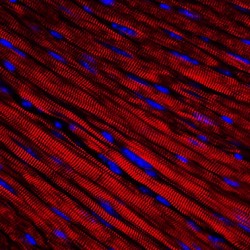
Emerging evidence suggests that high density lipoprotein (HDL) and the HDL receptor scavenger receptor class B type 1 (SR-B1) trigger signaling pathways in cardiomyocytes, protecting them directly against cardiotoxicity.
Anthracyclines, such as doxorubicin, are chemotherapeutic drugs, widely used to treat a variety of cancers. However, in addition to tumour cells, these drugs also trigger cell death in cardiomyocytes, giving rise to a major cardiotoxic side effect. In mouse model studies, we have found that either the genetic overexpression or the injection of apolipoprotein A1, a precursor HDL particle assembly, protects cardiomyocytes from doxorubicin-induced death. This protection is mediated by SR-B1 in cardiomyocytes, which signals in response to HDL, leading to the activation of pro-survival pathways.
We are continuing to study the molecular mechanisms through which SR-B1, HDL, and apolipoprotein A1 mediate cardioprotection.
